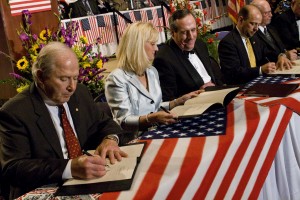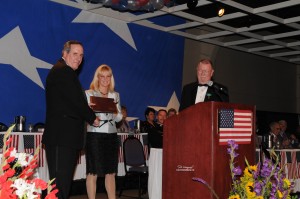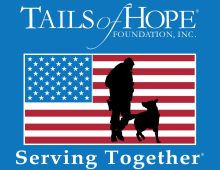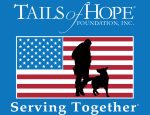The Convention on Cooperation Among
American Working Dog Organizations
“The capability they (Military Working Dogs) bring to the fight cannot be replicated by man or machine. By all measures of performance their yield outperforms any assist we have in our inventory. Our Army (and military) would be remiss if we failed to invest more in this incredibly valuable resource.”
Gen. David H. Petraeus. Feb. 9, 2008

On October 16, 2008, The Convention on Cooperation Among American Working Dog Organizations was first signed in Topeka, Kansas. The initial signatories included representatives of the American Kennel Club, the Doberman Pinscher Club of America, the German Shepherd Dog Club of America, the American Rottweiler Club, the United Doberman Club, the American Working Dog Federation, and the GSDCA-WDA.
On September 11, 2011, The Convention will be acceded to by more representatives of American Working Dog Organizations and AKC Parent Clubs, committing American Dog Breeders to cooperate with the Department of Homeland Security and other agencies to “develop programs designed to provide the ready supply of American working dogs” for use in protecting America.

The text of the Convention is set forth as follows:
CONVENTION ON COOPERATION AMONG AMERICAN WORKING DOG ORGANIZATIONS IN PROVIDING
AMERICAN DOGS FOR AMERICAN SECURITY
The organizations party to this convention, in the person of their authorized Representatives, hereinafter referred to as the Parties,
Aware of the dangers posed by acts of terrorism to the citizens of the United States of America,
Bearing in mind the historic role played by American dogs and their breeders in the defense of the United States throughout this nation’s armed conflicts,
Recognizing the service of American dogs and their breeders to the nation in many capacities in the present day,
Acknowledging that the crucial tasks to be played by dogs in the protection of the United States against acts of terrorism, including at ports of entry and along its borders, require that the government of the United States obtain a supply of working dogs,
Concerned that the acquisition by the government of the United States of dogs bred and raised in foreign nations is contrary to the best interests of the United States,
Wishing to render one another, the government and armed forces of the United States and of the several states the broadest possible assistance in increasing the use of American dogs for America’s security,
Have agreed as follows:
Article 1
For purposes of this Convention, the terms used in it mean:
“Detector dogs” – dogs trained to detect and alert and/or respond and/or indicate to the presence of certain scents or odors for which they have been trained.
“Orthogonal” – mutually independent methods of detecting items of interest such as using different detection and identification modalities.
“SWGDOG” – the Scientific Working Group on Dog & Orthogonal Detector Guidelines, a collaboratively funded effort of the Federal Bureau of Investigation (FBI), National Institute of Justice (NIJ), and the Department of Homeland Security (DHS) whose mission is to serve as a professional forum in which practitioners and practitioners from related fields can share, discuss, and evaluate methods, techniques, protocols, quality assurance, education, and research relating to detector dogs and orthogonal detection standards. SWGDOG addresses substantive and operational issues within the field of dog and orthogonal detector guidelines and works to build consensus-based, or so-called “best practice,” guidelines.
In furtherance of its mission, SWGDOG recommends and disseminates discipline guidelines for quality assurance and quality control, provides guidelines but does not mandate decisions of policy, discusses, shares and exchanges ideas regarding forensic analysis methods, protocols and research, brings together organizations and/or individuals actively pursuing relevant analysis methods for the purpose of exchanging and disseminating information, cooperates with other national and international organizations in developing relevant standards and monitors and disseminates research and technology related to the discipline.
“Terrorism” – premeditated, politically motivated violence perpetrated against noncombatant targets by subnational groups or clandestine agents.
Article 2
The Parties shall cooperate with SWGDOG in order to benefit local, state and federal law enforcement agencies by improvements in the performance and overall reliability of detector dogs and their optimized combination with electronic detection devices.
Article 3
In implementing the provisions of this Convention, the competent authorities of the Parties shall maintain direct relations with one another.
Article 4
The Parties shall, through joint consultations, jointly draw up recommendations for achieving concerted approaches to ensure the ready supply of American working dogs for the use of the Department of Homeland Security and other agencies of the United States, the Armed Forces of the United States, and state and local governmental agencies relating to the security of the United States.
The Parties shall cooperate with the Department of Homeland Security and other agencies of the United States, the Armed Forces of the United States, and state and local governmental agencies to develop programs designed to provide the ready supply of American working dogs for use as set forth in the paragraph immediately preceding.
Article 5
This Convention shall not limit the rights of the Parties to conclude bilateral and multilateral agreements on issues which are the subject of this Convention, and shall not affect the rights and obligations of Parties arising out of other agreements to which they are parties.
Article 6
Disputes arising out of the interpretation or application of this Convention shall be resolved by consultations and negotiations between the Parties.
Article 7
This Convention shall enter into force on the date of its signature, and for the Parties whose legislative processes require the completion of procedures for its entry into force on the date of completion of those procedures. The Parties shall notify the other Parties within three weeks from the signature of this Convention of the need to complete these procedures.
Article 8
This Convention shall remain in force for five years from the date of its entry into force, and shall be automatically extended for further five year periods unless the Parties adopt another procedure.
Article 9
Following the entry into force of this Convention, it may with the consent of the Parties be acceded to by other parties, by means of transmission to the Parties of instruments of accession. Accession shall be deemed to take effect upon the expiry of 30 days from the date of receipt by the Parties of the latest notification by the Parties of consent to such accession.
____________________________
To participate in the signing of the Convention, please go to our registration form.

